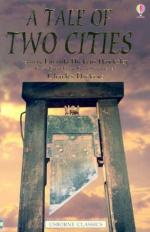|
This section contains 1,262 words (approx. 5 pages at 300 words per page) |

|
Revolution in A Tale of Two Cities
Summary: In his novel A Tale of Two Cities, Charles Dickens uses the wine, the storm, and the grindstone as important symbols used to depict the inevitability of the French Revolution. The wine represents both the extensive reach and the beastly nature of the revolution; the storm parallels the inevitability and the destruction about to be caused by the revolution; and the turning of the grindstone to sharpen the weapons of murder, like the turning of the Earth, is ceaseless and unstoppable.
Emma Goldman once said, "No real social change has ever been brought about without a revolution - Revolution is but thought carried into action." When faced with tyranny and oppression, revolution is indeed inevitable. Charles Dickens, in A Tale of Two Cities, portrays a poor French people, oppressed and miserable, who ultimately and inevitably rise up to overthrow the aristocracy through the bloody French Revolution. Throughout the novel, Dickens uses several instances of imagery and symbolism. The most significant of these symbols - the wine, the storm and the bloody grindstone - foreshadow and show the inevitability of the French Revolution.
The initial symbol used to foreshadow the revolution is the wine, which represents blood. Moreover, the wine was spilled in the house of Monsieur Defarge, one of the head revolutionary "Jacques." As the narrator tells us, "a large cask of wine had been dropped and broken, in...
|
This section contains 1,262 words (approx. 5 pages at 300 words per page) |

|


